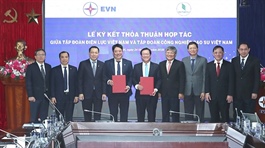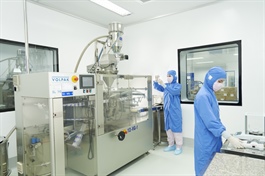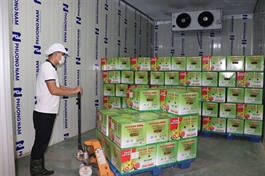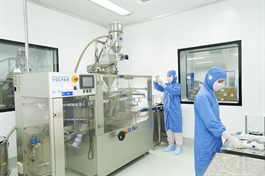Standards challenge Vietnamese exports amid tighter market regulations
Standards challenge Vietnamese exports amid tighter market regulations
Vietnam lacks specific standards for key agricultural export products, complicating outreach and inspection efforts.
Vietnamese exporters are facing growing pressure to meet evolving market standards and must respond swiftly to new requirements.
Experts recommend that relevant authorities ramp up efforts to disseminate updated regulations to farmers, cooperatives, and businesses across Vietnam. This would help minimize warnings and recalls while enhancing the capabilities for safe and sustainable production.
New import regulations in effect
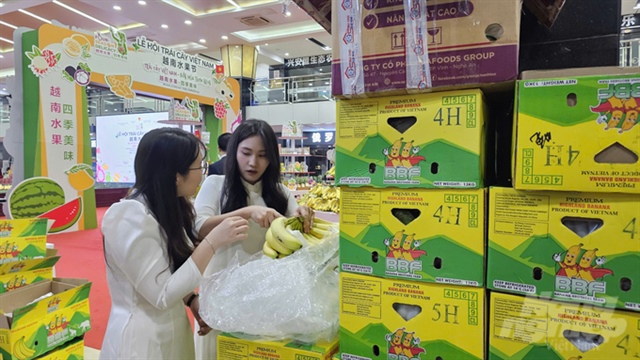
Vietnamese fruits are displayed at the “Vietnamese Fruits - Delicious All Year Round” festival in Beijing, China. Photo: Cong Thuong magazine |
In the first two months of 2025, the EU issued 624 warnings on global agricultural products, according to the Vietnam SPS Office at a meeting on February 24. Of these, 16 warnings concerned Vietnam's agricultural and food exports, including cashew nuts, processed shrimp, beverages, basil seeds, and snail meat.
Notably, four of the eight novel food warnings during this period were related to Vietnamese products, reported Ngo Xuan Nam, Deputy Director of Vietnam's SPS office.
He highlighted the challenges posed by novel food, which is causing confusion among Vietnamese businesses. He explained that novel food is defined as food that has not been consumed to a significant degree by humans in the EU before May 15, 1997, when the first novel food regulation came into force. As an example, beverages containing basil seeds are classified as novel foods due to their limited consumption before 1997.
He added that the EU defines novel foods as traditional foods from outside the EU. As a result, Vietnamese snail meat has received warnings for being classified as an "unauthorized novel food."
According to EU regulations, all novel foods must undergo a safety evaluation before they can be exported to the EU market, Nam said.
The deputy director of Vietnam's SPS office said the EU has high standards for food quality and safety, requiring compliance with SPS (sanitary and phytosanitary) and TBT (technical barriers to trade) regulations, including low maximum residue levels for pesticides.
However, many businesses have not updated their knowledge of new EU regulations on novel foods, product labeling and composite products. Local regulators have also been slow to address SPS-related issues. As of February 20, only 18 out of 63 provinces have developed plans to implement the SPS project, as required by the Prime Minister's directive.
At the same time, pesticides and fertilizers are being misused in domestic agricultural areas, while packaging and processing facilities often fail to comply with input material controls, according to the agency.
In addition to the EU, other markets are tightening import regulations.
Specifically, from January 2025, China requires all shipments of durian from Thailand and Vietnam to include certificates for auramine O and cadmium testing, following the discovery of auramine O residues in some Thai shipments late last year. This industrial dye is banned in food due to its carcinogenic risk, resulting in significant delays or rejections of shipments from Thailand, Malaysia and Vietnam, the three largest durian exporters to China.
Adapting quickly to new regulations
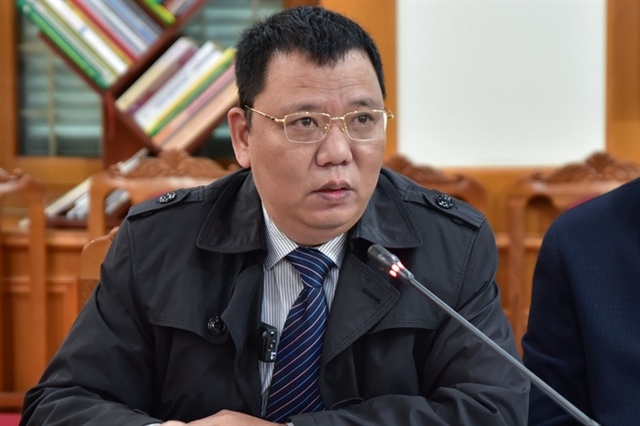
Ngo Xuan Nam, Deputy Director of the Vietnam SPS Office. Photo: VGP |
In response to emerging trade barriers, Ngo Xuan Nam said that the Vietnam SPS Office will assist Vietnamese exporters in complying with EU food safety regulations. This includes enhancing information dissemination and updating producers on EU standards to ensure they meet hygiene, safety, and disease control requirements.
The office will also work with EU agencies to ensure compliance with new regulations and address traceability issues for certain non-compliant firms, he added.
Nguyen Van Ha, Deputy Director of the Dak Lak Provincial Department of Agriculture and Rural Development, said Vietnam lacks specific standards for key agricultural export products, complicating outreach and inspection efforts. He noted that the department has received numerous guidelines, but found them to be inconsistent, leading to confusion among businesses and farmers.
Ha recommended that the Ministry of Agriculture and Rural Development develop standardized guidelines by crop group, detailing everything from raw material sourcing to processing, along with penalties for non-compliant products.
Echoing Ha's sentiments, Dang Phuc Nguyen, Secretary General of the Vietnam Fruit and Vegetable Association, suggested that communication efforts be stepped up to raise public awareness of the importance of adhering to export regulations. He emphasized the need for strict controls on pesticide residues in fruits and vegetables, as well as clear regulations on pathogens, food additives, and accurate labeling for consumers.
He also called for the development of easy-to-understand, detailed guidelines for production, packaging and export processes.
|
In 2024, the EU issued 5,268 warnings, of which Vietnam accounted for 114, nearly double the number issued in 2023. Ho Chi Minh City and Hanoi topped the list for the highest number of warnings. In Ho Chi Minh City, the number of warnings for agricultural and food products reached 34 out of 67 in 2023, 42 out of 114 in 2024, and four out of 16 in the first two months of 2025. Hanoi recorded seven out of 67 and 10 out of 114, with no warnings in 2023, 2024 and in the first two months of 2025, respectively. |
- 21:41 25/02/2025





